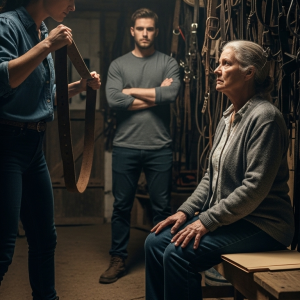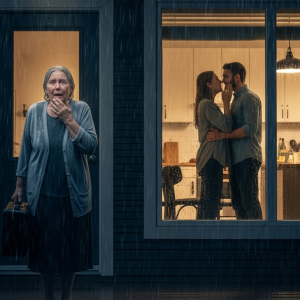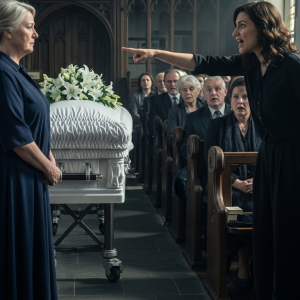My daughter slapped me. My son clapped. My daughter-in-law, Camille, smirked as if it were all perfectly rehearsed. In that moment, I didn’t cry or speak. I just walked out of the banquet they claimed was in my honor. For three years, I had stayed quiet, hoping they would remember the mother I once was. But when they brought a contract to erase me with a signature, I remembered a promise, a voice, and a document they had long forgotten.
That night, I unlocked the box my husband left me, and I finally wrote the ending they never saw coming.
The envelope was thick, arriving on a Tuesday. My name, Margo, was written in a flowing silver script. Not Mom, not Mother. Just a name. I sat at my kitchen table as the morning light touched the rim of my teacup. The house was still, filled with the unique silence of a home left behind by the children you raised.
Inside was a glossy invitation, embossed with floral flourishes. An Evening to Honor Our Matriarch, A Celebration of Legacy and Love. It was signed by my daughter, Lana—not by hand, but in a sterile, printed font. I held the card, staring at the words until they blurred. I hadn’t heard Lana’s voice in three years, not since she moved my things into the guest room without asking, just a week after my husband’s funeral.
It was a beautiful invitation, deliberately so. I could picture Lana at the print shop, fussing over paper weights and fonts. She always had an eye for aesthetics and a sharp sense of timing. The event was for next Saturday at my son Reed’s new home, the one with the open-concept kitchen and a backyard built for catered events.
What do you do when your children reappear in calligraphy after years of silence? When I had knee surgery, I took an Uber to the hospital. When the roof leaked last winter, I paid for it with my pension. Now, they wanted to honor me. Something about the perfect invitation felt wrong, too smooth and staged.
I picked up the phone and called Dolores, who used to work at the florist where Lana placed her corporate orders. There was a long pause. “Margo,” she finally said, her voice heavy, “they booked that venue three months ago. Your name wasn’t part of the plan. Not until last week.”
I hung up the phone slowly. So, it was never about honoring me. I would still go, not to be celebrated, but to see exactly what they were trying to bury.
I arrived five minutes early. A valet waved me toward the curb as if I were a curious neighbor. Reed’s house glowed with golden string lights. In the backyard, tables were set with linen, crystal, and centerpieces of cream-colored roses. My name was nowhere to be seen.
A young server pointed me toward a small, wobbly table near the kitchen door, tucked behind a potted ficus. There was no name card, no water glass. From my corner, I could hear the staff whispering as trays clinked. I pulled my shawl tighter. The air was warm, but a chill had settled deep in my bones.
Camille, my daughter-in-law, was the first I saw. She floated through the yard, a glass of wine in hand, laughing at something Lana whispered. When her eyes met mine, she didn’t smile. She gave a curt, almost imperceptible nod before looking away, as if my presence were an inconvenience.
Lana stood at the front, tapping a spoon against a champagne flute. “We gather tonight to mark the next chapter,” she began, her voice polished, “not just of our family’s legacy, but of how we define purpose, community, and stewardship.” She never once looked at me.
Reed stepped forward, adjusting his tie. “Tonight isn’t only about gratitude. It’s about vision, about structure, about the future of what our family has built.”
I felt it then. It wasn’t anger or grief. It was the strange, hollow feeling of being the guest of honor at your own retirement party, only no one had told you that you’d been let go. Near the front was a leather-bound folder with gold lettering. A notary stood beside it, holding a clipboard. They were parading it like a prize.
Lana glanced at the notary. “We’re ready to formalize the transition,” she announced. Camille turned slightly, her lips curling into a quiet, calculated smirk.
Reed added, “All we need is one more signature.”
The notary turned toward me. I didn’t move. Lana’s heels clicked on the stone patio as she approached. She leaned in, her voice a gentle poison. “This is just a formality, Mother. So we can move ahead.”
As I stood there, motionless, she lifted her hand and slapped me. It wasn’t a hard slap, but it was sharp and deliberate. Reed clapped once, a single, slow punctuation to the act. The room fell silent, but I didn’t cry. This wasn’t a surprise. It was a reveal.
The music continued playing from some distant speaker, a bizarre soundtrack to the sudden, heavy silence. My face stung, but not from pain—from clarity. The young notary stepped forward, clearing his throat and keeping his eyes low. “Mrs. Olden,” he said, treating me like the last item on a checklist, “the documents are ready.”
I glanced at the gold letters on the folder: Family Estate Reallocation. I opened it. Page after page of dense, typed text, with witness signatures already in place. A final, empty line waited for me. They had decided to erase me long before they sent the invitation.
Reed’s voice cut in, smooth but firm. “This just clarifies the trust structure, Mother. It keeps things clean. It’s not personal.” I looked at him, but he couldn’t hold my gaze.
Lana crossed her arms. “If you want to cause a scene, do it quickly. We have investors here.”
Camille said nothing. She simply leaned against the table, her fingers tracing the edge of a new white gold bracelet, likely purchased from the very fund they were now pushing me out of.
I rested my thumb over the signature line, then slid the folder closed. “I won’t be signing anything tonight,” I said, my voice even.
A different kind of silence fell—the kind that settles when a plan has gone wrong. Lana scoffed, her voice tight with frustration. “You’re being dramatic.” She reached for me again, but I stepped back.
From the corner of the garden, Reed clapped again. That single, slow, echoing sound. And Camille smirked, deeper this time. Satisfied. It was the look in her eyes that stayed with me. She had planned for this. She didn’t care that I saw it.
I walked away from the table. As I passed the guests, none of them met my eyes. Their chatter resumed as if I had merely played my small part and was now dismissed. Disposable. In my car, I sat with my hands on the wheel, my pulse steady. I had paid for Lana’s first apartment. I had packed Reed’s lunch until he left for college. They had tried to write me out, but I was not the kind of woman who left empty-handed.
At home, I went to the hall closet and pulled out the box from the top shelf. It was small, heavy, its lock still tight. I knew what was inside. The original will, a USB drive, and my husband’s voice, waiting.
I drove home without music, gripping the steering wheel as if it were my only anchor. In the rearview mirror, the red mark on my cheek was already fading, but the memory of Reed’s casual clap and Camille’s smug silence was seared into my mind.
In the quiet of my house, I unlocked the small wooden box my husband, Samuel, had left me. Inside lay the original copy of his will, the paper slightly yellowed but the ink still clear. Every word was a reminder of the man who saw me, truly saw me, when others had stopped looking.
Deeper in the box was the USB drive he had pressed into my palm days before he passed. “If they ever try to erase you,” he had whispered, “let them hear this.”
I plugged the drive into our old, reliable laptop. A single audio file appeared. I clicked it, and his voice filled the den—steady, calm, and deliberate.
“My name is Samuel Everett. This message is for whoever needs to understand my intent. My wife, Margo, built everything with me. Every cent, every idea, every sacrifice. I made sure the will reflects that. If anyone changes it, they are not just dishonoring me; they are denying the truth. Don’t let them write over the story we lived.”
The voice I hadn’t heard in years didn’t break me. It braced me. I closed the laptop, my hands no longer trembling. I wasn’t going to fight them with screams or pleas. I was going to hold the ground Samuel had preserved for me. That night, for the first time in months, I slept soundly, because I finally remembered who I was. And I knew Samuel never forgot.
I woke before sunrise, my purpose clear. At 8 a.m., I dialed Harold’s number, our old family lawyer. When he answered, he didn’t ask why I was calling after so many years. He just said, “I’ve been waiting for this call, Margo.” I told him everything. He listened without interruption, then asked for the documents.
My second call was to Dolores. She had been the compassionate heart of the foundation my husband and I built, until one day she was just… gone. She chuckled when I asked why. “Because your daughter-in-law said I was dead weight. Said it while wearing a jacket I know you gave her.” She agreed to meet that afternoon.
The final call was to Evelyn at the credit union, who had worked closely with Samuel. I asked her to check for unusual activity on our family accounts. She paused. “Margo, if something is wrong, you deserve to know. Let me do some digging.”
By the end of the day, I had three allies. One who knew the law, one who knew the players, and one who knew where the paper trail began. The silence had protected the wrong people for too long. Now, every conversation felt like reclaiming a piece of myself.
I spent the next morning at my kitchen table, piecing together the broken puzzle of our family’s finances. Dolores had flagged a few dates on the trust account statements, which led me to wire transfers marked as “consulting fees.” One payment of $16,000 stood out, made to an agency named “CMC Advisory.” I didn’t need a lawyer to recognize Camille’s initials.
Next, I examined the family foundation’s expenses. Lana had organized a “wellness retreat” for women in leadership, which turned out to be an invite-only spa trip for her friends, paid for with $37,000 listed under “community outreach.” Dolores found the photo album online, showing Lana clinking champagne glasses under a banner that read, Rooted in Renewal.
Finally, Evelyn called back from the credit union. Her voice was careful. She confirmed that Camille had recently tried to replace my name with Reed’s as a trustee on two accounts, submitting a scanned letter with a forged signature. “I flagged it for now,” Evelyn said, “but you should know Reed is already acting like it’s approved.”
The pieces fit. They thought I was too slow, too sentimental to fight back. By sunset, I had three folders of evidence, two digital backups, and a clear timeline. I wasn’t fighting for revenge. I was fighting to restore the truth.
Harold arrived the next morning. He didn’t waste time on pleasantries. He laid out the plan: three letters. They were not demands, but their weight could knock down walls built on lies.
The first, addressed to Reed, outlined the criminal liability of presenting a forged document. Harold had traced the “consulting fees” Camille had funneled, with Reed’s digital signature beside hers. The second, to Lana, detailed the misuse of foundation funds for her spa events, with receipts to match.
The third and most powerful letter was sent to our family bank and the regional estate authority. It contained the original, notarized will and a transcript of my husband’s audio recording. This wasn’t a warning; it was a preemptive strike.
I sat in my garden as Harold finalized the documents. The stillness was heavy, but no longer suffocating. For the first time in years, I felt I wasn’t the one scrambling. Harold looked at me before he left. “You’re doing this with dignity, Margo. They won’t see it coming because they never believed you would stand up at all.”
That evening, I lit a candle. Tomorrow, the letters would land. Camille’s facade would crack, Reed’s entitlement would falter, and Lana’s carefully curated image would show its seams.
The first call was from Reed. His voice was clipped, too calm. He said the bank had frozen their joint account. He tried to sound angry, but I could hear the fear underneath. He quickly blamed Camille for handling the finances, then mumbled that maybe it had been Lana’s idea. I just listened.
The second call was from Camille, her tone laced with ice. She accused me of staging a coup. When my silence unnerved her, she snapped. “If you go forward with this, I’ll make sure everyone remembers your past. Their debts, their shame. I know people who remember.”
My hands were steady. “I remember them, too,” I said, and hung up.
The third was a voicemail from Lana. She didn’t deny anything; she begged. Her investors had pulled out. The expansion for her spa chain had collapsed. She cried, then said something that laid their motives bare: “I never wanted to cut you out. I just thought it would be easier if the story ended your way.”
Easier. Their story had unraveled, not because I tore it down, but because I refused to be a character in it. They had forgotten who I was. And now, I was making them remember.
The meeting was at 10 a.m. in Harold’s small, unadorned conference room. I arrived first, wearing the same blue coat I wore to Samuel’s funeral. Not for drama, but for memory. Lana arrived pale and silent. Reed followed, his suit too crisp for a man who had lost control. Camille was last, her makeup flawless but her eyes darting around the room.
Harold placed three folders on the table. I stood. “This isn’t a negotiation,” I said. “This is a correction.”
No one moved.
“Your father’s will remains unchanged. It stands, as does the evidence that you attempted to rewrite it. But I’m not keeping the estate.”
That got their attention. I watched the calculations shift behind their eyes.
“I’m placing it all into a foundation. A trust. A scholarship fund for women who, like me, were erased inside their own homes.” I slid the first page across the table. “The fund is named ‘For Those They Forgot.’ Your father once told me I was the glue that held this family together, and then you forgot me. But forgetting does not erase. It only delays.”
Reed exhaled sharply. Camille clenched her jaw. “Why?” Lana whispered.
I didn’t need to answer. Harold handed them each a copy of the foundation’s legal structure. Their inheritance was gone, transformed into a legacy that would help others rebuild. I gathered my coat. “Legacy is what you leave in truth,” I said, “not what you snatch in secret.”
Then I walked out. I had not just reclaimed legal ground; I had reclaimed meaning. And as I stepped into the cold morning light, the only thing I carried was peace.
The fallout was quiet but swift. Reed’s access to the family funds was suspended. A brief segment on the regional news mentioned a “high-profile family” facing an “internal legal dispute,” showing a blurred image of our estate. Camille’s skincare sponsors pulled out. Lana’s investors vanished.
Reed left a furious message about me “weaponizing” the family name. I didn’t return his call. It wasn’t revenge or justice. It was exposure, and exposure has its own undeniable weight.
One evening, Camille knocked on my door. I didn’t open it. Instead, I slid an envelope underneath. Inside, I had written: I once waited for you to remember I was family. Now I am simply Mrs. Margo Landry, a woman who decided to keep what she built. I will not undo what has been done, and I will not open this door. I heard her read it, then walk away without a word.
Inside, Dolores was finalizing the paperwork for the foundation. The state had approved our nonprofit charter. We had a name, a seal, and a mission. It wasn’t just about legacy anymore. It was about rebuilding something honest in a world that had tried to bury it.
The morning was quiet. On the local news, a small segment announced the launch of a new community initiative: For Those They Forgot. The screen showed a black-and-white photo of my husband with a quote beneath it: We remember those they tried to erase.
I watched in silence, feeling not pride, but a sense of rightness, of something returned to where it belonged. I had not sought revenge. I had only followed the path my husband left me, trusting that truth, even when quiet, could still be heard.
I opened the back door, and the garden greeted me. It had bloomed gently in places I hadn’t noticed before. Not bold blooms, just enough to say, I’m still here. And so was I.
They thought I would sign because they called me Mother. But being a mother is not the same as giving everything away. Sometimes it means knowing when to stop giving. Sometimes it means choosing yourself.
And this time, I did.




